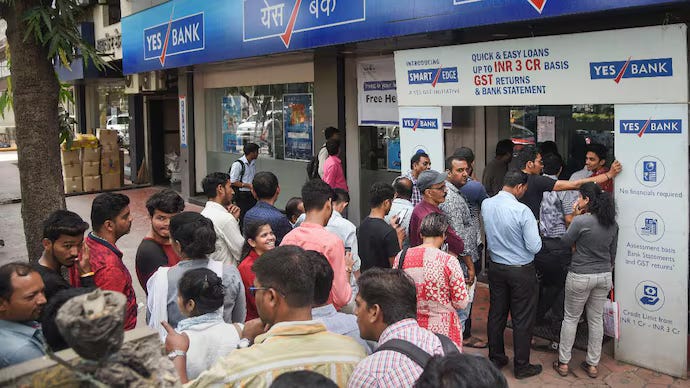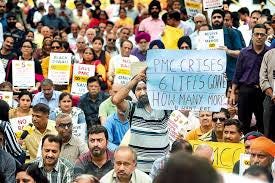Zero Trust of Indians in financial institutions and digital instruments.
Mistrust of financial institutions and digital instruments has been heightened due to bad experiences, lack of knowledge about policies, poor cybersecurity, and the trauma of demonetization.
The ruling government loves to showcase their digital payments applications and share that even foreigners are using them and find it convenient. Its a fact these digital instruments like UPI have made financial transactions so much easier and seamless. There is no need to carry physical money, credit and debit cards. The financial institutions now encourage customers across of all income groups to use these applications instead of coming to the physical locations.
But what does the common Indian think? What is their experience ? Do they find it useful and convenient for themselves ?
The Voice of the People.
A taxi driver I met in Delhi pays a *30% premium* to a broker to get prepaid tax receipts from MCD, though he knows he can link his bank account to it. "Ek galti hui to poora account khali kar denge".
Another taxi I took in Bombay didn't have a Fastag. The owner didn't want the amount to be blocked, so prefers to stand in the cash line for 20 minutes every time he crosses the Sea Link. Imagine the productivity lost due to this lack of trust.
Another taxi driver with exactly the same story. He was sold an HDFC credit card by a Direct Selling Agent. He diligently paid the minimum due amount, believing it to be the "EMI", but the loan kept growing. He never knew he was paying 43% interest, while the interest on his personal loan is 13.5%. Apart from the financial loss, the loss of trust really hurts him. He feels cheated, and pursued like a criminal. His reaction to this incident is to swear off credit cards altogether.
Even middle class and rich Indians are famously averse to subscriptions. Amazon's subscribe and save offering has almost no adoption in India. We don't put anything on auto debit unless forced to (for EMI payments for example).
“None of the watchmen, cleaners & maids i have worked with prefer bank accounts. A common reasoning was that banks deduct money without their knowledge. Perhaps these were the banking fees they didn't know about. But that's a substantial mistrust that banks should solve.”
“I am 41 yr old, have worked in a leading financial institution for 15 yrs. Would never link my bank acc to UPI. I tell everyone I know, the same. I have a small balance of 10k in Paytm bank account where I use UPI Financial institutions will scam you and fraud u if u are not looking.”
Lack of trust due to the country’s poor cybersecurity
The servers of All India Medical sciences were hacked in an alleged ransomware attack on November 23rd . It took 19 days for the systems to restart and for online appointments to be made. After cyberattack on AIIMS, ICMR website faced 6,000 hacking attempts in 24 hours. The Safdarjung Hospital reported cyberattack but not a ransomware attack. However these weaknesses and vulnerabilities have been raised by various people to the government. Dr Deepak Agrawal, from the neurosurgery department, who was then chairperson of the computerization committee, wrote to the Union Health Ministry. “there is no database administrator, security administrator and system administrator at site for the installation, putting the whole project at risk,” wrote Dr Agrawal. the medical superintendent of AIIMS, Dr D K Sharma, also brought up similar issues in a report about the implementation of the e-Hospital. “There is no disaster backup for maintaining continuity of operations in case of primary site failure, despite repeated requests to the NIC for the same. This can have very serious repercussions on patient care,” wrote Dr Sharma.
Trauma and memory of Demonetization and other Bank Crises
The other reason for the lack of trust is demonetization and the trauma of standing in serpentine, unending queues to withdraw money from the banks and ATMs. The fact that overnight a decision can be taken which devalues certain currency notes which people have worked hard and sacrificed for and that they now have no choice but to queue to withdraw their own money still creates trauma and anxiety for most. There were more than 50 people who died as a result of demonetization and it destroyed many sectors of the economy. The PMC Bank and Yes Bank Crises have also caused severe trauma and distress for the depositors. The lives of many were lost due to life savings not being able to be accessed.
Desperate Need to restore trust in Institutions and Systems
It can be seen that there is a serious need to action by the government as well by the regulatory authorities such as the Reserve Bank of India and also SEBI.
At ground level the banks and also NGO’s can have sessions on financial literacy with people of various income groups which will make them more aware and empowered about the processes and information. They will also clear all their doubts and concerns as well which will help restoring some trust among them.
At the policy level the government and financial agencies must fix the technical glitches which seem to be the major source of anxiety and mistrust. The system of refund must also be made more efficient in case of errors and glitches. The banks both public and private must make available all information with regards to all its services and facilities in all languages and simply put so the customer is fully aware of what they are signing up for. If there is any issue the customer can complain or lodge a case against the bank.
With regards to cyber security there obviously must be necessary appointments made for various critical posts. The next would be upgradation of its current infrastructure so hacking of data and other such ransomware attacks are difficult. For this greater international collaboration which key tech giants such as the United States, China would be useful.
The government must work on restoring trust with regards to its financial institutions and digital systems as if it is done then it will not need any efforts and campaign to promote its systems, its citizens itself will do it and promote it across the world.



